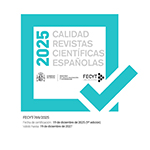Emprendedoras rurales de la industria agroalimentaria ante las políticas públicas: segregación ocupacional en territorios vulnerables
Resumen
El artículo analiza las políticas públicas dirigidas a activar el emprendimiento de las mujeres, de las zonas de Inversión Territorial Integrada albacetense, en la industria agroalimentaria. El análisis, con perspectiva de género, muestra su influencia en la segregación ocupacional: a nivel global, promocionando actividades interdependientes a los territorios con la industria agroalimentaria auxiliar feminizada; y, a nivel local, cristalizando actividades económicas precarias, alternativas, donde la cadena global de cuidados y la acción social de las mujeres rurales sostiene la comunidad.
Con una triangulación metodológica eminentemente cualitativa se recogen las voces de mujeres emprendedoras y pequeñas empresarias evidenciando, por ejemplo, la disonancia entre el discurso oficial y el de ellas. El capital cultural, social y económico construye imaginarios laborales irruptores en la comunidad, mostrando el (des)equilibrio del mercado de trabajo y la actividad económica basada en concepciones patriarcales y de clase.
Descargas
Descarga artículo
Licencia
La revista Sociología del Trabajo, para fomentar el intercambio global del conocimiento, facilita el acceso sin restricciones a sus contenidos desde el momento de su publicación en la presente edición electrónica, y por eso es una revista de acceso abierto. Los originales publicados en esta revista son propiedad de la Universidad Complutense de Madrid y es obligatorio citar su procedencia en cualquier reproducción total o parcial. Todos los contenidos se distribuyen bajo una licencia de uso y distribución Creative Commons Reconocimiento 4.0 (CC BY 4.0). Esta circunstancia ha de hacerse constar expresamente de esta forma cuando sea necesario. Puede consultar la versión informativa y el texto legal de la licencia.









